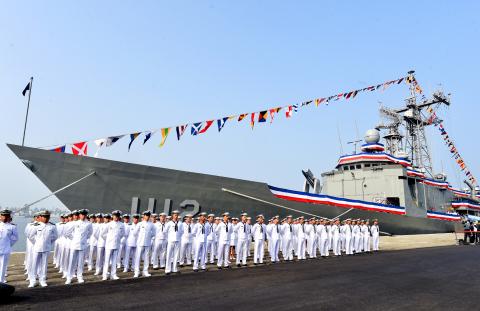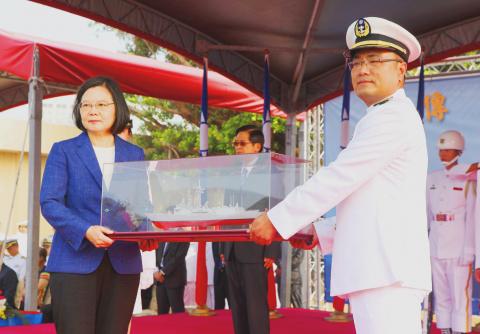President Tsai Ing-wen (蔡英文) yesterday vowed that the nation would not “concede one step” in defending itself as she inaugurated two frigates purchased from the US.
The two Perry-class guided missile frigates were commissioned in a ceremony at the Zuoying naval base in Kaohsiung.
Built in the 1980s, the frigates were originally named USS Taylor and USS Gary, and were part of a US$1.8 billion arms deal to Taiwan announced in 2015 under then-US president Barack Obama. They have been renamed Ming Chuan (銘傳) and Feng Chia (逢甲).

Photo: Chien Jung-fong, Taipei Times
They have “high mobility, high sea resistance and low noise,” and are fitted with the SQR-19 sonar system currently used by the US Navy, the Republic of China Navy said.
The ships are to patrol the Taiwan Strait, it added.
Navy Chief of Staff Vice Admiral Lee Tsung-hsiao (李宗孝) had previously said that the warships’ anti-submarine capabilities are more advanced than the nation’s eight Cheng Kung-class frigates and could have a “deterrent effect” against Chinese submarines.

Photo: Chien Jung-fong, Taipei Times
“We want to send a clear and firm message from Taiwanese to the international community that we will not concede one step in defending ... Taiwan and protecting our free and democratic way of life,” Tsai said after inspecting the ships.
Beijing’s “military actions in the region not only attempt to weaken Taiwan’s sovereignty, but also damage regional peace and stability,” Tsai said.
She highlighted the unconventional “three warfare” threats from the Chinese People’s Liberation Army: psychological, public opinion and legal warfare.
The global security situation is undergoing rapid change and the nation is facing a new array of security challenges, including China’s military exercises near the nation’s periphery, she said.
Beijing deploys conventional and unconventional military methods against Taiwan, including leveraging information technology, the Internet and new media to flood Taiwan with disinformation, she said.
Incessant cyberattacks on the nation’s government and enterprises are a national security threat that Taiwan must confront by self-strengthening — its unchanging principle to protect its place in the world, she said.
“It is my solemn hope that the armed forces will follow three noes: no forgetting the mission to defend Taiwan, no giving up on safeguarding regional peace and stability, and no forgetting the threat of foreign forces,” she said.
The American Institute in Taiwan (AIT) in a news release said that the sale of the warships contributes to the military balance in the Indo-Pacific region.
“This sale is consistent with US commitments under the Taiwan Relations Act to provide military articles that support Taiwan’s self-defense,” the institute said.
The frigates “will improve Taiwan’s capability in current and future defensive efforts, and further Taiwan’s continuing work to modernize its armed forces,” it said.
The AIT said it sent representatives to yesterday’s ceremony, including AIT Kaohsiung head Matthew O’Connor and members of the AIT team “to signify our enduring support to Taiwan’s defense under the provisions of the Taiwan Relations Act of 1979.”

DAREDEVIL: Honnold said it had always been a dream of his to climb Taipei 101, while a Netflix producer said the skyscraper was ‘a real icon of this country’ US climber Alex Honnold yesterday took on Taiwan’s tallest building, becoming the first person to scale Taipei 101 without a rope, harness or safety net. Hundreds of spectators gathered at the base of the 101-story skyscraper to watch Honnold, 40, embark on his daredevil feat, which was also broadcast live on Netflix. Dressed in a red T-shirt and yellow custom-made climbing shoes, Honnold swiftly moved up the southeast face of the glass and steel building. At one point, he stepped onto a platform midway up to wave down at fans and onlookers who were taking photos. People watching from inside

A Vietnamese migrant worker yesterday won NT$12 million (US$379,627) on a Lunar New Year scratch card in Kaohsiung as part of Taiwan Lottery Co’s (台灣彩券) “NT$12 Million Grand Fortune” (1200萬大吉利) game. The man was the first top-prize winner of the new game launched on Jan. 6 to mark the Lunar New Year. Three Vietnamese migrant workers visited a Taiwan Lottery shop on Xinyue Street in Kaohsiung’s Gangshan District (崗山), a store representative said. The player bought multiple tickets and, after winning nothing, held the final lottery ticket in one hand and rubbed the store’s statue of the Maitreya Buddha’s belly with the other,

‘NATO-PLUS’: ‘Our strategic partners in the Indo-Pacific are facing increasing aggression by the Chinese Communist Party,’ US Representative Rob Wittman said The US House of Representatives on Monday released its version of the Consolidated Appropriations Act, which includes US$1.15 billion to support security cooperation with Taiwan. The omnibus act, covering US$1.2 trillion of spending, allocates US$1 billion for the Taiwan Security Cooperation Initiative, as well as US$150 million for the replacement of defense articles and reimbursement of defense services provided to Taiwan. The fund allocations were based on the US National Defense Authorization Act for fiscal 2026 that was passed by the US Congress last month and authorized up to US$1 billion to the US Defense Security Cooperation Agency in support of the

‘COMMITTED TO DETERRENCE’: Washington would stand by its allies, but it can only help as much as countries help themselves, Raymond Greene said The US is committed to deterrence in the first island chain, but it should not bear the burden alone, as “freedom is not free,” American Institute in Taiwan Director Raymond Greene said in a speech at the Institute for National Defense and Security Research’s “Strengthening Resilience: Defense as the Engine of Development” seminar in Taipei yesterday. In the speech, titled “Investing Together and a Secure and Prosperous Future,” Greene highlighted the contributions of US President Donald Trump’s administration to Taiwan’s defense efforts, including the establishment of supply chains for drones and autonomous systems, offers of security assistance and the expansion of